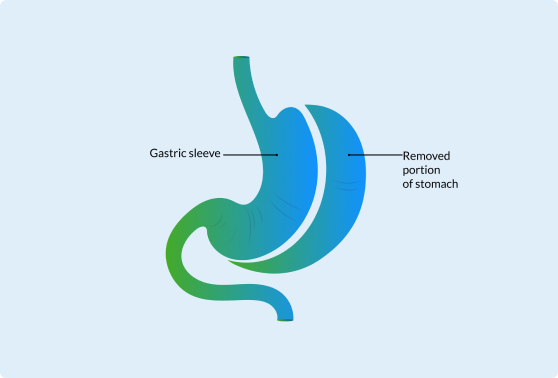- procedure
Medical Weight Loss
Physician Supervised Medical Weight Loss
Medication and injections for weight loss
How Does Medical
Weight Loss Work?
Weight loss can involve much more than just diet and exercise. When it comes to medical weight loss in Portland, it is a strategy—carefully designed by a medical professional—that includes a full understanding of your body’s needs; nutritional guidance, the utilization of medication or injectables for weight loss, and frequent check-ins to keep you accountable. The combination of a balanced diet, exercise, and accountability will help you reach sustainable goals.

The OWLS Approach to Medical Weight Loss
Your first step is a personalized consultation with our surgeon where we review your relationship with food, your medical history, and discuss your previous experiences with weight loss programs. All of this will factor into your personalized medical weight loss plan. At Oregon Weight Loss Surgery, your treatment will include:
- A personalized, one-on-one consultation with our specialists.
- All necessary lab orders, prescriptions and we help facilitate prior authorization.
- A tailored weight loss plan designed to help you lose weight and keep it off.
- Continuous support throughout your program, including education and advice.


How do I know if weight loss injections or medication is right for me?
If you’re in the Portland area, and you want to know if physician supervised medical weight loss is right for you, the best first step is to schedule a consultation after reviewing the following criteria:
- AOM (anti-obesity) medication indications – adults with obesity (BMI ≥ 30 kg/m2), or overweight (BMI ≥ 27 kg/m2) with at least one weight-related comorbid condition.
- You have tried other weight loss methods, with little to no success
- You have underlying conditions such as diabetes
- You have genetic conditions that make it difficult to lose weight
- You have had bariatric surgery and have gained weight back
Types of weight loss injections or medications
Semaglutide
At Oregon Weight Loss Surgery, we are proud to offer Semaglutide in Portland and surrounding areas. Semaglutide is a cutting-edge, FDA-approved medication that supports chronic weight management in adults with obesity or those with weight-related conditions and health risks. Semaglutide is a GLP-1 receptor agonist that’s similar to in cretin, a naturally-occurring hormone that controls your appetite.
As such, the semaglutide medication can control your appetite and prevent hunger pangs, thus supporting your weight loss goals.
Semaglutide is a one-of-a-kind drug only meant for individuals who are overweight or obese, i.e., those with a BMI of 27 or more and a weight-related condition, such as diabetes, or those with a BMI of 30 or more. Please note that this medication isn’t an alternative to exercise and a healthy diet—it can only support other weight loss efforts, such as exercise, a low-calorie diet, and behavior changes.
Tirzepatide
Tirzepatide serves as a pharmaceutical-grade weight loss supplement renowned for its appetite-suppressing effects, facilitating a sensation of fullness quicker and for extended durations. Specifically engineered to target the GLP-1 receptor situated in the gastrointestinal tract, Tirzepatide orchestrates signals to the brain, prompting a cessation of hunger cues.
By leveraging this precise mechanism, Tirzepatide effectively induces feelings of satiety, alleviating hunger pangs. Moreover, it exhibits the capability to inhibit the release of ghrelin, a hormone associated with hunger, thereby facilitating adherence to low-calorie dietary regimens.
In addition to killing your appetite, our Tirzepatide in Portland can also slow down the digestive processes within your stomach. This medication makes your stomach empty out slower, so you continue feeling sated long after your meals, preventing you from snacking between meals. Studies have shown that consistent use of Tirzepatide, in combination with a healthy diet and regular exercise, can lead to a5% to 22.5% reduction in total body weight.
Liraglutide
Liraglutide is a medication that belongs to a class of drugs known as glucagon-like peptide-1 (GLP-1) receptor agonists. It is used primarily for the treatment of type 2 diabetes mellitus. Liraglutide works by mimicking the action of a hormone called GLP-1, which helps regulate blood sugar levels by stimulating insulin secretion, slowing down gastric emptying, and reducing appetite.
In addition to its use in diabetes management, liraglutide has also been approved for weight management in certain individuals who have obesity or who are overweight and have weight-related complications. When used for weight management, it is administered at a higher dose than when used for diabetes treatment.
Liraglutide is typically administered via subcutaneous injection.
Phentermine
Phentermine is a medication primarily used for short-term weight loss in individuals who are overweight or obese. It is classified as a sympathomimetic amine, which means it works by stimulating the release of certain neurotransmitters in the brain, specifically norepinephrine, to suppress appetite.
Phentermine is typically prescribed as part of a comprehensive weight loss program that includes dietary changes, exercise, and behavior modification. It is intended for use in individuals who have not been able to lose weight through diet and exercise alone and who have certain risk factors related to their weight.
Because of its potential side effects and interactions with other medications, phentermine should only be used under the guidance of a healthcare professional. It is typically recommended for short-term use only, usually a few weeks to a few months. Long-term use is generally not advised due to the risk of developing tolerance and dependence.
Qsymia
Qsymia is a prescription medication approved by the U.S. Food and Drug Administration (FDA) for chronic weight management in adults who are overweight or obese. It is a combination medication containing two active ingredients: phentermine and topiramate extended-release.
Phentermine, as mentioned earlier, is an appetite suppressant that works by stimulating the release of certain neurotransmitters in the brain to reduce appetite and promote weight loss.
Topiramate is an anticonvulsant medication used to treat epilepsy and prevent migraines. Its exact mechanism of action in promoting weight loss is not fully understood, but it is thought to involve appetite suppression and modulation of certain neurotransmitter systems.
The combination of phentermine and topiramate in Qsymia is believed to enhance weight loss by targeting both appetite control and satiety, making it easier for individuals to adhere to a reduced-calorie diet and achieve weight loss goals.
Qsymia is typically prescribed as part of a comprehensive weight loss program that includes dietary modifications and increased physical activity. It is indicated for long-term use, but its safety and effectiveness over periods longer than two years have not been established.
Due to its potential side effects and risks, Qsymia should only be used under the supervision of a healthcare professional and is typically recommended for individuals with a body mass index (BMI) of 30 or higher, or those with a BMI of 27 or higher with weight-related comorbidities.
How It Works
How long do I need to stay on weight loss medication?
The duration you should stay on weight loss medication can vary depending on several factors, including your individual health status, weight loss goals, response to the medication, and guidance from Oregon Weight Loss Surgery surgeons.
In some cases, weight loss medications are prescribed for a specific period, typically ranging from a few weeks to several months. During this time, your progress will be monitored, and dosage may be adjusted.
Some weight loss medications, such as short-term appetite suppressants or medications used for jump-starting weight loss, may be prescribed for a relatively short duration, such as a few weeks or months. These medications are often used aspart of a comprehensive weight loss program that includes dietary changes, exercise, and behavioral therapy.
Other medications, such as those used for long-term weight management, may be prescribed for a more extended period, potentially for several months or even years. These medications are typically used in individuals who have obesity or overweight with other health conditions and who have not achieved sufficient weight loss through lifestyle changes alone.
Keep in mind that weight loss medication is typically most effective when used aspart of a comprehensive approach to weight management, which includes healthy eating, regular physical activity, behavior modification, and ongoing support.
For those who may not qualify for weight loss medications, our surgeons may suggest weight loss surgery as more suitable option for you.
OWLS Offers a Range of Bariatric Surgical Options
Oregon Weight Loss Surgery is a medical practice in Portland, Oregon specializing in surgical procedures for weight loss, primarily targeting individuals who struggle with obesity or overweight and have not achieved desired results through traditional methods such as diet and exercise alone. These surgical procedures, often referred to as bariatric surgery, aim to help patients lose weight by reducing the size of the stomach or altering the digestive process, which can lead to significant and sustainable weight loss.
Oregon Weight Loss Surgery offers a range of bariatric surgical options, including Sleeve Gastrectomy, Gastric Bypass, Gastric Banding, and other minimally invasive procedures. These surgeries work by restricting the amount of food the stomach can hold or by changing the way food is digested, resulting in reduced calorie intake and, consequently, weight loss.


In addition to surgical interventions, Oregon Weight Loss Surgery provides physician supervised medical weight loss, comprehensive pre-operative and post-operative care, including consultations, medical evaluations, nutritional counseling, behavioral support, and follow-up appointments to monitor progress and address any concerns.
Oregon Weight Loss Surgery is dedicated to helping individuals in Portland, Oregon, achieve their weight loss goals and improve their overall health and quality of life through safe and effective surgical interventions combined with comprehensive care and support.
Frequently Asked Questions
Answers to all your Oregon Weight Loss Surgery questions and more. If you haven’t found what you’re looking for, please contact us at the link below.
What is the process to get gastric sleeve surgery?
The best first step for bariatric surgery is to schedule a consultation with our office. During the consultation, we will review your medical history and medications, and provide details of the best option for your specific goals.
How does gastric sleeve surgery differ from other weight loss surgeries like gastric bypass or gastric banding?
Unlike gastric bypass, which involves rerouting the digestive system, or gastric banding, which involves placing a band around the stomach to create a smaller pouch, gastric sleeve surgery involves removing a portion of the stomach. This surgery primarily works by reducing the stomach's size and appetite-regulating hormones, leading to weight loss.
Are there any dietary or lifestyle changes I'll need to make before and after the surgery?
Yes, before surgery, patients typically undergo a pre-operative diet to shrink the liver and reduce surgical risks. After surgery, dietary changes involve transitioning from liquid to soft foods and eventually to solid foods over several weeks. Long-term dietary modifications include eating smaller, more frequent meals, avoiding high-calorie and high-sugar foods, and prioritizing protein-rich foods. Regular physical activity and behavior modifications are also essential for successful weight loss and weight maintenance.
Does insurance cover gastric sleeve surgery?
Whether insurance covers gastric sleeve surgery can vary depending on several factors, including your insurance provider, specific policy, and individual circumstances. In many cases, insurance may cover gastric sleeve surgery if it is deemed medically necessary and meets certain criteria established by the insurance company.
Do you have a self-pay program for gastric sleeve?
Yes, we have a comprehensive program for self-pay patients that includes all fees and follow up visits plus our Enhanced Care Package. To inquire about the cost, please contact our office.
© 2026 Oregon Weight Loss Surgery. All Rights Reserved. Powered by Engage 365 Media